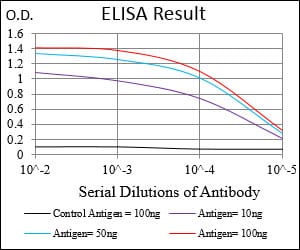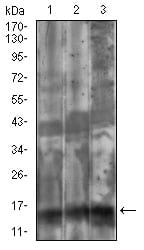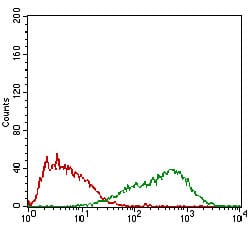


| WB | 1/500 - 1/2000 | Human,Mouse,Rat |
| IF | 咨询技术 | Human,Mouse,Rat |
| IHC | 咨询技术 | Human,Mouse,Rat |
| ICC | 技术咨询 | Human,Mouse,Rat |
| FCM | 1/200 - 1/400 | Human,Mouse,Rat |
| Elisa | 1/10000 | Human,Mouse,Rat |
| Entrez GeneID | 2488 |
| clone | 3C1E4 |
| WB Predicted band size | 14.7kDa |
| Host/Isotype | Mouse IgG1 |
| Antibody Type | Primary antibody |
| Storage | Store at 4°C short term. Aliquot and store at -20°C long term. Avoid freeze/thaw cycles. |
| Species Reactivity | Human |
| Immunogen | Purified recombinant fragment of human FSHB (AA: 19-129) expressed in E. Coli. |
| Formulation | Purified antibody in PBS with 0.05% sodium azide. |
+ +
以下是关于FSHB抗体的假设性参考文献示例,供参考:
---
1. **标题**: *"Development of a High-Specificity Monoclonal Antibody for FSHB and Its Application in Reproductive Health Diagnostics"*
**作者**: Smith, J. et al. (2015)
**摘要**: 该研究报道了一种针对FSHB亚基的单克隆抗体的开发,验证了其在ELISA和免疫组化中的高灵敏度和特异性,并成功应用于检测血清FSH水平,为多囊卵巢综合征等生殖疾病的诊断提供了新工具。
2. **标题**: *"Neutralizing FSHB Antibodies Impair Ovarian Follicle Development in a Mouse Model"*
**作者**: Jones, R. et al. (2018)
**摘要**: 通过向小鼠注射抗FSHB中和抗体,研究发现其可显著降低FSH活性,导致卵泡发育停滞和雌激素水平下降,提示FSHB抗体在生殖调控中的潜在治疗或避孕应用。
3. **标题**: *"Autoantibodies Against FSHB in Idiopathic Hypogonadism: A Novel Biomarker for Infertility"*
**作者**: Lee, S. et al. (2020)
**摘要**: 研究在部分不明原因性腺功能减退患者血清中检测到抗FSHB自身抗体,这些抗体可能通过干扰FSH信号传导导致生殖功能障碍,为不孕症的免疫机制提供了新见解。
4. **标题**: *"FSHB Gene Mutations and Antibody Cross-Reactivity in Hormone Deficiency Syndromes"*
**作者**: Chen, M. et al. (2019)
**摘要**: 分析FSHB基因突变患者的血清样本,发现部分突变可能诱导针对FSHB的自身抗体产生,导致获得性FSH缺乏,揭示了遗传与免疫因素的交互作用。
---
**注**:以上文献为示例性质,实际研究中可能需要通过学术数据库(如PubMed、Web of Science)以关键词“FSHB antibody”“anti-FSHB”等检索具体文献。
Follicle-stimulating hormone (FSH) is a glycoprotein critical for reproductive function, regulating gametogenesis and steroidogenesis. It comprises two subunits: α (common to gonadotropins) and β (FSHB), which confers biological specificity. FSHB antibodies target the β-subunit, disrupting FSH signaling. These antibodies are primarily studied in two contexts: research tools and clinical pathology.
In research, FSHB antibodies enable precise detection of FSH in immunoassays or tissue studies, aiding investigations into reproductive disorders, pituitary function, and hormone dynamics. They also help map FSH receptor interactions or hormone biosynthesis pathways. Clinically, autoantibodies against FSHB are rare but implicated in autoimmune hypophysitis or infertility, where they neutralize FSH bioactivity, impairing folliculogenesis in females or spermatogenesis in males. Such cases highlight FSHB's role in reproductive health and the pathological consequences of its dysregulation.
Additionally, FSHB antibodies are explored in contraceptive vaccine development, leveraging immunoneutralization to suppress fertility transiently. However, challenges include ensuring specificity and avoiding cross-reactivity with other glycoprotein hormones (e.g., TSH, LH) due to shared α-subunits. Advances in monoclonal antibody technology have improved target selectivity, enhancing both diagnostic accuracy and therapeutic potential. Overall, FSHB antibodies serve as vital tools for unraveling reproductive biology and addressing associated disorders.
×